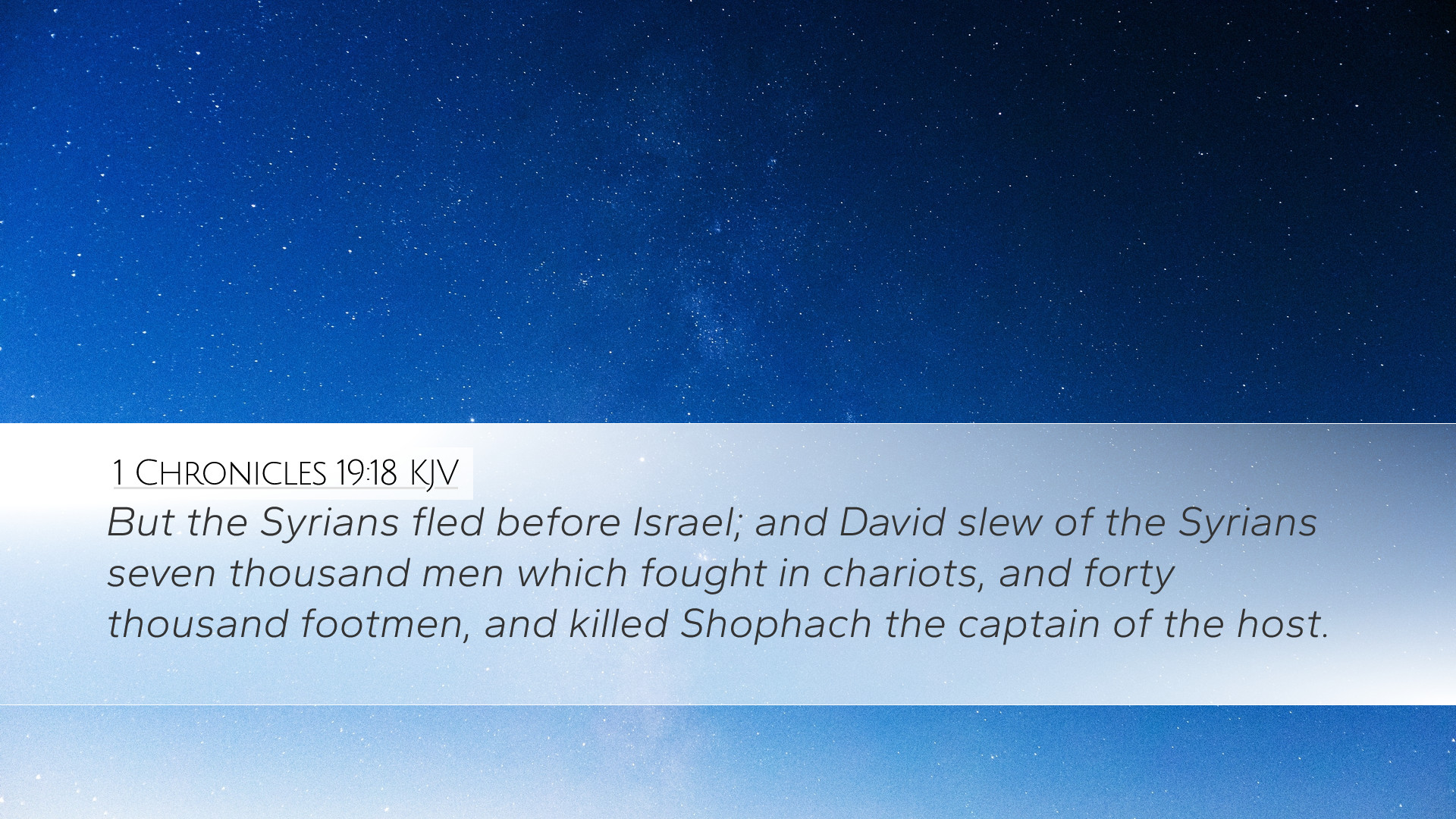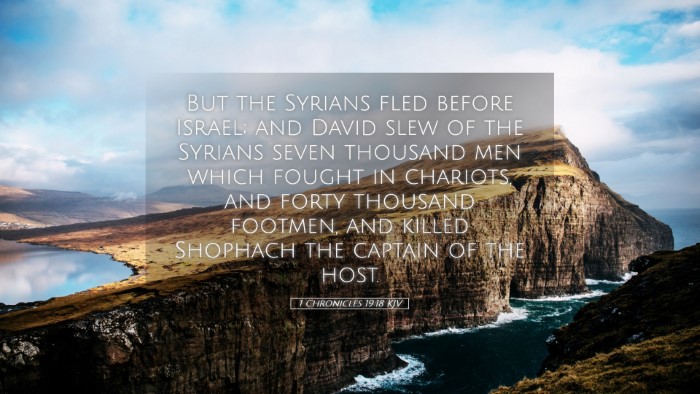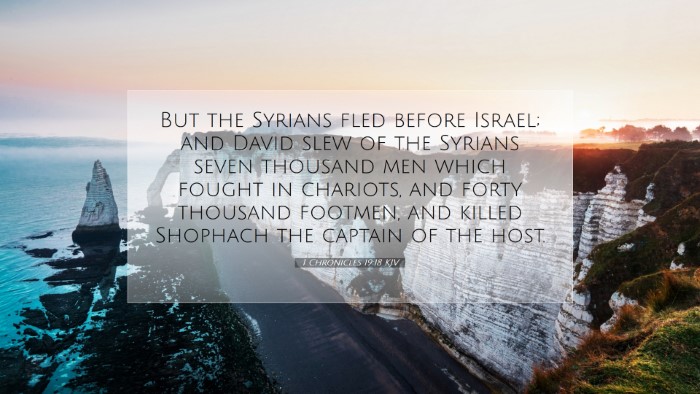Commentary on 1 Chronicles 19:18
Verse Reference: 1 Chronicles 19:18 - "But the Syrians fled before Israel; and David slew of the Syrians the men of seven hundred chariots, and forty thousand footmen, and killed Shobach the captain of the host."
Introduction
This verse encapsulates a significant military triumph for Israel under King David. It situates the reader within a narrative marked by power dynamics and divine favor, revealing both the events of warfare and the underlying theological implications of victory. In analyzing this text, we draw insights from various public domain commentaries, enhancing our understanding of the historical, spiritual, and theological contexts.
Historical Context
The conflict depicted in this passage illustrates the ongoing confrontations between Israel and its neighboring nations, particularly the Syrians. Matthew Henry emphasizes that David's military campaigns were often met with fierce resistance, but through divine assistance, Israel achieved decisive victories. This not only underscores David's prowess as a military leader but also highlights the theocratic belief that Israel's successes were rooted in God's will.
David's Leadership
Albert Barnes highlights David's strategic acumen, noting that his ability to inspire and rally his forces was fundamental to their success. David’s leadership style was marked by reliance on God, which served to foster courage and unity among his men. His victories can be viewed as a theologically significant phenomenon; each win solidified the nation's identity as the chosen people of God.
The Significance of the Numbers
The text references a staggering casualty count among the Syrians, with 700 chariots and 40,000 foot soldiers slain. Adam Clarke posits that these numbers are not merely historical but carry symbolic weight, representing God’s complete dominion over the forces arrayed against His people. The overwhelming defeat of the Syrians serves to epitomize the futility of opposing God's plans and purposes, reinforcing the belief in His ultimate sovereignty.
Theological Insights
The defeat of the Syrians at the hands of David's forces serves as a powerful illustration of God’s protection and intervention on behalf of His covenant people. Matthew Henry points out that even amidst human conflict, the divine hand is active, guiding events toward the fulfillment of His promises. The punishment of opposing nations is reflective of God's justice, while His favor towards Israel underscores His covenant loyalty.
Victorious Warfare as Divine Favor
In the context of ancient Israelite belief systems, victories in battle were seen as indicative of God’s approval. Barnes remarks on the connection between Israel's military success and their faithfulness to God, suggesting a reciprocal relationship between divine favor and national success. Such theological reflections offer pastors and theologians frameworks for understanding the expression of divine will in modern contexts, challenging them to consider how faith informs present-day struggles and victories.
The Role of Leadership in Spiritual Warfare
David's role can also be viewed in light of spiritual warfare principles discussed in the New Testament. Adam Clarke draws parallels between David's physical battles and the spiritual battles believers face today. The passage thus serves as a template for understanding how leaders must rely on God for strength, wisdom, and victory in both earthly and spiritual arenas.
Personal Application
For modern-day believers, 1 Chronicles 19:18 serves as a reminder of God's faithfulness in delivering His people from oppression. Pastors may find it pertinent to address how congregations can draw upon this narrative to cultivate resilience and hope in times of adversity. The text encourages believers to engage actively in spiritual warfare, equipped with faith and reliance on divine strength.
Encouragement in Trials
Henry suggests that the victories of the past serve to bolster faith in present challenges. Just as David’s men were emboldened by previous successes, so too can modern believers be inspired by historical accounts of God’s deliverance. This pattern of remembrance fosters a spirit of faithfulness and anticipation for future victories, aligning with the biblical exhortation to always give thanks for what God has done.
The Implications for Community and Unity
The unity demonstrated in David's army against the common enemy sets a standard for how communities of faith can come together in the face of adversity. Barnes encourages communal prayer and strategic cooperation as essential elements for spiritual victories in contemporary contexts. This passage serves as an impetus for collective action, urging believers to support one another in the pursuit of God's will.
Conclusion
1 Chronicles 19:18 reveals profound truths about divine sovereignty, the importance of leadership, and the nature of spiritual warfare. By examining this verse through the lenses of historical and theological commentary, we gain valuable insights into the character of God and the expectations He has for His people. Such reflections not only enhance scholarly understanding but also promote practical applications for faith communities today.
Final Exhortation
As scholars, pastors, and theologians engage with this passage, may it be a source of strength and encouragement, reminding them of God’s promise to fight on behalf of His people. In the face of adversities, may they trust in His deliverance and take heart from the victories of the past as harbingers of hope for the future.


